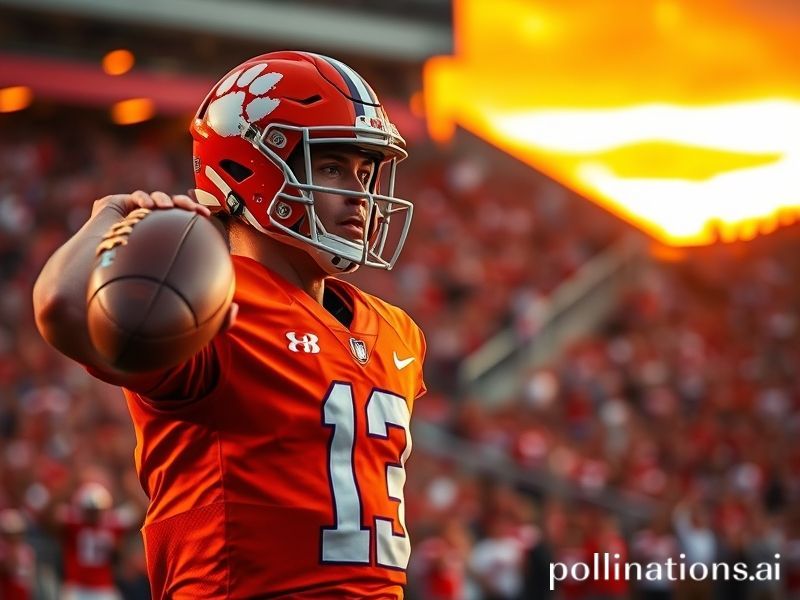Cade Klubnik: How a College QB Became the World’s Most Unlikely Geopolitical Pawn
Cade Klubnik, quarterback savior of the Clemson Tigers, woke up last Saturday on a continent that still thinks a “tight end” is an unfortunate consequence of yoga class. Yet by nightfall, his 38-35 overtime escape against Notre Dame had ricocheted through encrypted group chats from Singapore to São Paulo, proving once again that American college football is the world’s most improbable soft-power export since the McRib.
Let us zoom out for the uninitiated billions. Clemson University—population 27,341, roughly the size of a midsize Malawian village—occupies a swath of South Carolina real estate where kudzu grows faster than GDP. Against this verdant backdrop, Klubnik, a 20-year-old Texan with the haircut of a 1950s missionary and the arm of a ballistic missile, is expected to deliver not only touchdowns but existential meaning to a fan base that has already pre-booked disappointment therapy through 2027.
Globally, the spectacle reads like kabuki performed by corn-fed giants. European sophisticates sneer that the game stops every eleven seconds for committee meetings; meanwhile, their own Champions League is sponsored by a Gulf state whose record on labor rights makes the NCAA look like Amnesty International. Asian crypto-bros, awake during Eastern Standard kickoffs, livestream the game on mute while trading $TIGERCOIN derivatives that fluctuate whenever Klubnik scrambles. South American viewers compare the Tigers’ paw-print helmets to the kind of branding you’d find on a particularly aggressive energy drink. Everyone agrees the marching band is overkill; nobody changes the channel.
Klubnik’s sudden international relevance is partly algorithmic destiny. ESPN’s parent company, majority-owned by a pension fund in Norway that also holds stock in wind turbines and weaponized herring, broadcasts Clemson games to 200 countries because live sports are the last appointment television the human race hasn’t figured out how to pirate properly. Each time Cade zings a 40-yard post route, the global Q-score for “American college athlete” ticks up like a Geiger counter in Chernobyl gift-shop. Advertisers from Lagos to Lahore queue up to slap their logos on the slow-motion replay of a 19-year-old’s ACL snapping—because nothing sells consumer electronics like vicarious agony in HD.
There is, naturally, a darker calculus here. The NCAA’s unpaid-labor model is so cartoonishly exploitative that even the Vatican has subtweeted it. Klubnik’s jersey retails for $139.99—none of which he sees, naturally—while garment workers in Bangladesh churn out replicas for dimes, proving that late capitalism can run a post route around irony itself. If the young quarterback blows out a knee, he’ll be replaced by the next five-star messiah, and the machine will hum along, lubricated by hope and orthopedic surgeons’ student loans.
Yet the world can’t look away. In Kyiv, a bar screens Clemson games because the colors match the national flag, and because watching actual war footage 24/7 is, well, a bit much. In Melbourne, insomniacs place micro-bets on whether Klubnik will audible to a run before the play clock hits :03, a ritual that feels almost ancient compared to doomscrolling wildfire alerts. Even Canadian viewers—traditionally smug about their politeness—find themselves screaming at a 19-year-old’s read progression, thereby puncturing the national myth of emotional moderation.
At press time, Clemson’s playoff odds sit at 12 percent, according to a supercomputer in Switzerland that also models Alpine avalanche risk. Klubnik himself, when asked about geopolitical ramifications, offered: “I just want to win.” Admirable, really. Somewhere in the Hague, a war-crimes prosecutor jots down the same line for his closing argument.
And so we return to the moral of the story, dear international reader: A kid from Austin throws an inflated pigskin across a painted field, and seven time zones away, a Nairobi Uber driver misses a turn because he’s checking the score. The world keeps spinning—imperfectly, unfairly, hilariously—on the axis of unpaid spectacle. If that isn’t the human condition in a nutshell, then I’ve been filing from the wrong planet.







